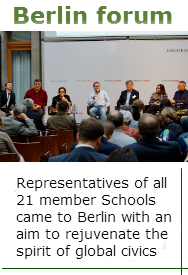“Towards a Backward Slide of Human Rights and Democracy in Countries of the post-Soviet Space?”
Regional Meeting of Schools of Political Studies from the Eastern European and Southern Caucasus region during the World Forum for Democracy, 27-29 November 2013
A discussion of the human rights situation in the post-Soviet Space is very timely, in particular in respect of the results of the EU’s Vilnius Summit on the Eastern Partnership and the subsequent pro-European demonstrations in Ukraine. André Härtel (DPP), who moderated the meeting and introduced the subject, pointed to the complexity of the issue due to the diversity of the region, the difficulty to obtain reliable information from often biased sources, and the self-centered Western perspective on the post-Soviet space. May we really speak about a “backdrop” of human rights and democracy considering the priority of state-building and economic issues in the region for at least the first century after the demise of the Soviet Union? How decisive is the role of Russia as the biggest state in the region and often a role model for others?
Here, the ambivalent state of democratic development in the region comes to the fore: whilst in Russia the authorities adopted a tougher policy on civil society and has thus strengthened the authoritarian trend, the frequent mass demonstrations against his regime since 2011 and the rise of new opposition forces such as Mr Navalny are reflecting a contradictory development. Finally, the importance of geopolitical trends in the region has made authoritarian states such as Russia and Azerbaijan much more self-confident actors in recent years, in spite of the West’s often naive and therefore largely unsuccessful policy approaches for the region.
The subsequent discussion focused on three questions: first, how participants assess the state of democracy and human rights in the region; secondly, how they evaluate the policies of European institutions toward the post-Soviet states and thirdly, what the SPS network might be able to do in order to help improve the situation.
As for the state of human rights and democracy in the region, views expressed were quite diverse: Participants from Belarus noted that although people in their countries were tired of being told lies by the government, there was a lack of knowledge about how to practice democracy and the concept of responsibility remained alien to many. Participants from the Moscow school added that one should consider evolution as superior to revolution concerning the improvement of human rights standards, and that education should be a priority. A participant of the Moldovan school even expressed his concern that the concept of democracy is sometimes misunderstood in the region as to give everyone completely unconstrained liberty.
As for the policies of European institutions, participants felt that EU conditionality has only been successful in weakly politicised areas, whilst no tangible reform efforts were made in sensitive issues affecting elites. Furthermore, European institutions were criticised for their lack of co-operation in election observation, leading to the disastrous multi-message reports after the last presidential elections in Azerbaijan. Many participants called for more assertive individual sanctions against human rights offenders in the regimes, in particular with regard to the Belarus and Azerbaijan cases. All European sources, including the new EED, should be used to improve the state of human rights in the region.
Finally, the participants agreed that the SPS network is a very important forum giving future political and civil society leaders the opportunity to learn about democratic practice and values and to exchange views without being exposed to the pressure of repressive incumbent elites. In order to have more impact on the EU, the envisaged extension of the Schools’ network to Central and Western Europe and future common activities were welcomed.








